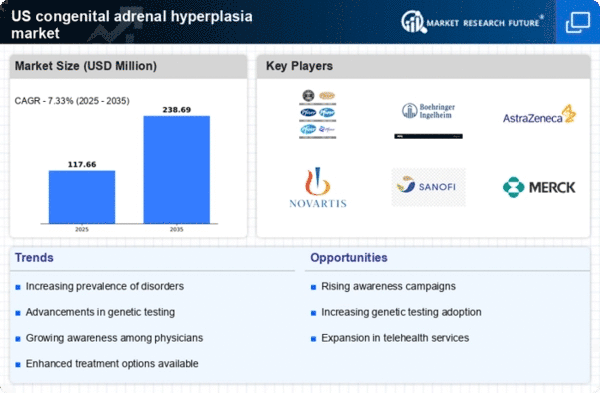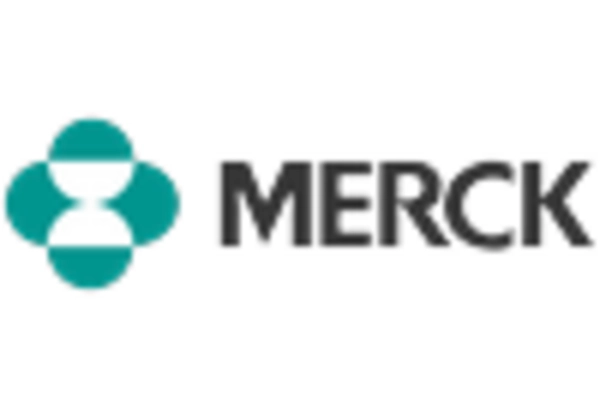Government Initiatives and Funding
Government initiatives and funding play a pivotal role in shaping the congenital adrenal-hyperplasia market. Various federal and state programs are aimed at improving healthcare access and funding research for rare diseases, including CAH. The National Institutes of Health (NIH) and other governmental bodies allocate substantial resources to support research and development in this area. In recent years, funding for CAH-related research has seen an increase, which is likely to foster innovation in treatment options and improve patient care. Additionally, public health campaigns aimed at raising awareness about CAH are supported by government entities, further driving the market. These initiatives not only enhance the visibility of the condition but also encourage collaboration between researchers, healthcare providers, and pharmaceutical companies, ultimately benefiting the congenital adrenal-hyperplasia market.
Growing Demand for Hormonal Therapies
The market is witnessing a growing demand for hormonal therapies, which are essential for managing the symptoms of CAH.. Corticosteroids, such as hydrocortisone and fludrocortisone, are commonly prescribed to patients, and their demand is expected to rise as awareness of CAH increases. The market for these therapies is projected to reach approximately $1 billion by 2027, reflecting a CAGR of around 6% during the forecast period. This growth is driven by the need for lifelong treatment in affected individuals, as well as the development of new formulations that improve patient compliance. As healthcare providers continue to emphasize the importance of effective hormonal management, the market for these therapies is likely to expand, contributing to the overall growth of the congenital adrenal-hyperplasia market.
Increased Focus on Patient-Centric Care
The market is increasingly shifting towards patient-centric care models, which prioritize the needs and preferences of patients.. This trend is evident in the development of personalized treatment plans that consider individual patient characteristics, including genetic profiles and lifestyle factors. Healthcare providers are adopting a more holistic approach to managing CAH, which includes not only medical treatment but also psychological support and education for patients and families. This focus on comprehensive care is likely to enhance patient satisfaction and adherence to treatment regimens. As healthcare systems in the United States continue to evolve, the emphasis on patient-centric care is expected to drive demand for innovative solutions and services within the congenital adrenal-hyperplasia market, ultimately improving health outcomes.
Technological Innovations in Diagnostic Tools
Technological advancements in diagnostic tools are significantly impacting the congenital adrenal-hyperplasia market. Innovations such as next-generation sequencing and improved hormone assays are enhancing the accuracy and speed of CAH diagnosis. These advancements allow for earlier detection of the condition, which is crucial for effective management and treatment. The market for diagnostic tools is projected to grow, with estimates indicating a compound annual growth rate (CAGR) of around 8% over the next few years. As healthcare facilities adopt these cutting-edge technologies, the demand for related services and products is expected to rise. This trend not only benefits patients through improved outcomes but also drives competition among manufacturers to develop more efficient diagnostic solutions, thereby expanding the overall market landscape.
Rising Incidence of Congenital Adrenal Hyperplasia
The market is experiencing growth due to the increasing incidence of congenital adrenal hyperplasia (CAH) in the United States.. Recent estimates suggest that CAH affects approximately 1 in 15,000 births, leading to a heightened demand for diagnostic and therapeutic solutions. This rise in incidence is prompting healthcare providers to enhance screening protocols, thereby increasing the market's potential. As more infants are diagnosed early, the need for effective treatment options becomes critical, driving investments in research and development. The growing patient population necessitates a robust supply of medications and healthcare services, which in turn stimulates market growth. Furthermore, the increasing awareness among parents and healthcare professionals about CAH is likely to contribute to the expansion of the congenital adrenal-hyperplasia market, as timely interventions can significantly improve patient outcomes.
















